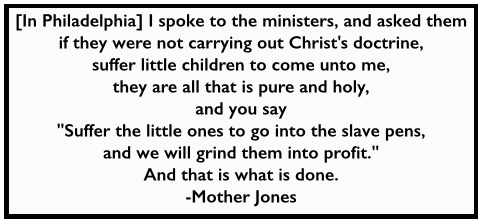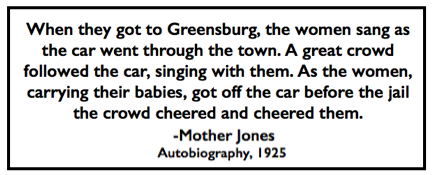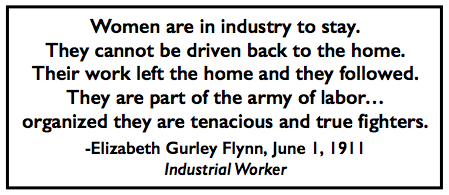 —————
—————
Hellraisers Journal – Tuesday June 13, 1911
Art Young on Hours and Wages of Working Women and Children
From The Coming Nation of June 10, 1911:
 —————
—————
Hellraisers Journal – Tuesday June 13, 1911
Art Young on Hours and Wages of Working Women and Children
From The Coming Nation of June 10, 1911:
 —————
—————
Hellraisers Journal – Friday June 9, 1911
National Consumers’ League Stands with Working Women & Children, Part II
From The Coming Nation of June 3, 1911:
How Women Help Women
By Grace Potter
[Part II of II.]
How Infection is Carried in Clothes
Not the healthiest living nor the strongest constitution is always proof against the germs of scarlet fever, for instance. They are carried readily in clothing, say, an overcoat. Perhaps, even, the man or the woman or children who worked on that overcoat, no one of them had scarlet fever. But the baby of the family where the coat was finished might have had it. The poor haven’t time to care for their sick. They don’t know what ails their children often when they are really very ill. A doctor costs money. It costs much time, which is the same as money to them, to take the little one to a dispensary and wait through hours of weary impatience for attention. Perhaps, too, their child would be taken from them and put in a hospital. And the poor have a reasonable dread of hospitals. So when the babies are taken sick they often go through a disease like diphtheria, tonsillitis, or scarlet fever, without anyone knowing what is the matter.
The little one has to be kept in the same room where the work is going on. It is the least dark room of the two or three or four in their flat. When the baby is picked up for the scant attention which is all that a tenement mother with the tenderest mother feelings in the world can give, the baby leaves infection upon its mother’s dress and the infection is the next moment transmitted to the coat mother is working with. The coat when done is carefully folded, taken back to the shop, later shipped to St. Paul, perhaps, and there bought by a prosperous business man.
 —————
—————
Hellraisers Journal – Thursday June 8, 1911
The National Consumers’ League Stands with Working Women and Children
From The Coming Nation of June 3, 1911:
How Women Help Women
By Grace Potter
[Part I of II.]
HE National Consumers’ League believes that the six million wage-working women in the United States are in many ways earning their bread under greater difficulties than the men wage slaves endure.
The shirt waist strike two years ago and the present strike of the box makers in New York illustrate one of the handicaps women suffer. Whatever move they made in the progress of their battle, the shirt-waist strikers were hauled into police court. They were often treated brutally by policemen, they were thrust into cells, they were fined, they were imprisoned. They suffered as no men strikers ever have in New York. The police were not deterred from unjust action against these young women by the thought of the way they might vote at the next election, because women have no vote.
Woman’s inferior physical strength, her maternal cares, her need to give attention to her home the while she is a wage earner, all are handicaps, too.
The National Consumers’ League is trying to make conditions better for working women because she is so handicapped. Incidentally they are making conditions better for men in many places.
It was over twenty years ago that the Consumers’ League was started in New York City. It has spread to many states and many countries since then and it is still spreading. It has two definite aims:
1. To abolish the sweating system.
2. To extend among all mercantile establishments commendable conditions.These are the means taken to accomplish such ends:
1. The Consumers’ League Label.
2. The White List of Fair Houses.
 —————
—————
Hellraisers Journal – Sunday June 4, 1911
Greensburg, Pennsylvania – Miners’ Wives Sing on Their Way to Jail
From the Wilkes-Barre Times Leader of June 2, 1911:
MINERS’ WIVES ARE JAILED WHEN
THEY SHOUT AT WORKERS
———-
Eleven Torn from Families on Complaint of
Coal Company Officials at Greensburg.
———-TWO WERE CARRYING BABES
—–
Prisoners Will Have to Spend Thirty Days
in Jail Unless Judge Changes Mind.
—–
GREENSBURG, Pa., June 2.-With tearful faces, but defiant in their stand for their husbands, who are striking miners in the Irwin coal fields, eleven women were torn from their husbands and children, who had accompanied them to the Westmoreland county jail, and locked up to serve thirty-day sentences, imposed for disorderly conduct.
The women are from Westmoreland City, and it was alleged by the prosecutors, who are officers of the coal company, that the women had made the night hideous for the inhabitants with their shouting and had been a menace to the men who were working for the company [scabs].
They were arrested on warrants issued before Squire H. A. Meerhoff, of Irwin, who sentenced them.
Two of the prisoners, Mrs. Margaret Means and Mrs. Dot Smith, carried babies in their arms. A crowd gathered around the jail when it became known that a band of strikers wives were being locked up.
Judge A. D. McConnell ordered twenty strikers who were brought before him from Latrobe and Bradenville, charged by the Latrobe Connellsville Coke Company with violating the court’s injunction, to pay the costs or stand committed. They were also ordered to remove their camp at Superior No. 2 within the next five days or be sent to jail.
This is the second bunch of strikers who were ordered to pay the costs for violating the court’s injunction issued a year ago restraining them from marching “by or near” company property. There is some talk among the United Mine Workers of making an appeal from the court’s decision, especially in the matter of ordering them to remove their camp, which is located on private property which they have leased.
—————
[Newsclip added from Pittsburg Post of June 2, 1911]
 ———-
———-
Hellraisers Journal – Saturday June 3, 1911
Elizabeth Gurley Flynn: Organize Women in Strong Industrial Unions
From the Spokane Industrial Worker of June 1, 1911:
WOMEN IN INDUSTRY SHOULD ORGANIZE
———-BY ELIZABETH GURLEY FLYNN
From the viewpoint of a revolutionary socialist there is certainly much to criticize in the present labor organizations. They have their shortcomings, of so pronounced a character that many thoughtful but pessimistic workers despair of practical benefit from assisting or considering them further. Yet unionism remains a vital and a burning question to the toilers, both men and women.
[…..]
Little need be said of he seven million wage-earning women. That unionism is their one great weapon, hardly admits of argument. Even more than their brother toilers do these underpaid and overworked women need co-operative effort on their own behalf. Yet many of their experiences with the old unions have been neither pleasant nor encouraging. Strike after strike of cloak makers, shirt waist makers, dressmakers, etc on the East Side of New York has been exploited by rich faddists for woman’s suffrage, etc., until the points at issue were lost sight of in the blare of automobile horns attendant on their coming and going. A band of earnest, struggling workers made the tail of a suffrage kite in the hands of women of the very class driving the girls to lives of misery or shame, women who could have financed the strike to a truly successful conclusion were they seriously disposed, is indeed a deplorable sight. But the final settlement of the many widely advertised strikers left much to be desired.
 —————
—————
Hellraisers Journal – Friday June 2, 1911
“The Insurrectos” by Kate Brownlee Sherwood
From the Spokane Industrial Worker of June 1, 1911: